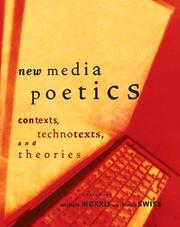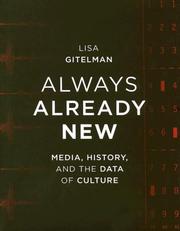| Listing 1 - 10 of 28 | << page >> |
Sort by
|
Periodical
ISSN: 24994553 Year: 2015 Publisher: Torino : Accademia University Press,
Abstract | Keywords | Export | Availability | Bookmark
 Loading...
Loading...Choose an application
- Reference Manager
- EndNote
- RefWorks (Direct export to RefWorks)
IJCoL is the half‐yearly journal founded by the Italian Association of Computational Linguistics. The journal intends to cover a broad spectrum of topics related to natural language and computation tackled from different perspectives.
digital humanities --- information sciences --- linguistics --- cognitive science --- Computational linguistics --- Digital humanities --- Humanities
Periodical
ISSN: 23351535 23351853 Year: 2013 Publisher: Bejaia, Algérie Université Abderrahamane MIRA - Bejaia, Faculté des lettres et des langues
Abstract | Keywords | Export | Availability | Bookmark
 Loading...
Loading...Choose an application
- Reference Manager
- EndNote
- RefWorks (Direct export to RefWorks)
Multilinguales est une revue de la Faculté des Lettres et des Langues (FLL) de l'Université Abderrahmane Mira – Bejaia (Algérie). Sa langue de rédaction est le français, mais elle est ouverte à la réflexion sur toutes les langues. Elle ambitionne de contribuer aux investigations scientifiques dans des disciplines telles que la linguistique, la sociolinguistique, l’ethnolinguistique, la psycholinguistique, les différentes théories littéraires, les sciences pédagogiques et didactiques, l’interprétariat, la traductologie, le traitement automatique des langues, etc. Multilinguales publie des numéros thématiques et, exceptionnellement, des numéros varia et des numéros spéciaux.
surveys --- literature --- educational sciences --- linguistics --- corpus approaches --- digital humanities
Book
ISBN: 9782875622808 Year: 2021 Publisher: Liège : Presses universitaires de Liège,
Abstract | Keywords | Export | Availability | Bookmark
 Loading...
Loading...Choose an application
- Reference Manager
- EndNote
- RefWorks (Direct export to RefWorks)
Scholars today are experimenting with a vast array of reading devices in order to explore texts anew, often blending, both on the technical and on the hermeneutical axes, traditional approaches and innovative computing tools, that collect textual features and detect trends not visible to a human eye as they exceed the span of our focus. Our understanding of poetry is not left untouched by the revolution that computational analysis is bringing to the humanities. Because of its intrinsic link to verse, poetry has been a very early object of statistical studies. Any careful examination of metres, rhymes, or caesuras is bound to generate large datasets, calling for the borrowing of methods from the exact sciences. Indeed, attempts at a mathematical evaluation of poetic styles largely predate the use of computers, and the methodological turn towards the use of new technologies has been generally well-received within the academic community. Still, is the mechanically enhanced, “nonhuman” reading of poems fruitful, or even legitimate? Must the literary scholar, whose object is a fundamentally “human” material, meet the burden of proof and possibly cast away intuitions? Conversely, can calculations account for the subtlety of our poetic experience? Is poeticity, in other words, to be found in the measurable sum of artfully assembled processes, or does it escape all normalisation efforts? Stemming from the group Plotting Poetry, a community of scholars of different language areas, working on different time periods and poetical genres, who have come together to share their findings and methods, this volume presents a rich sample of research endeavours in the field. It illustrates how a mechanically-enhanced reading can be put to the test, serve to pursue traditional hermeneutical questions, challenge certain assumptions about forms, reveal unsuspected thematic patterns, feed the approach of the literary historian, or open up new, unthought-of paths for our questionings. It is aimed both at specialists of either poetry or digital humanities, and at a broader readership curious to learn about computational approaches to poetry studies.
Poetry --- Literature and technology --- Digital humanities. --- Data processing

ISBN: 1282098365 9786612098369 0262280213 1429477377 0262311739 9780262280211 9781429477376 9781282098367 9780262513388 0262513382 0262134632 9780262134637 6612098368 Year: 2006 Publisher: Cambridge, Mass. MIT Press
Abstract | Keywords | Export | Availability | Bookmark
 Loading...
Loading...Choose an application
- Reference Manager
- EndNote
- RefWorks (Direct export to RefWorks)
The first collection of writings on poetry that is composed, disseminated, and read on computers; essays and artist statements explore visually arresting, aurally charged, and dynamic works that are created by a synergy of human beings and intelligent mac.
Periodical
Abstract | Keywords | Export | Availability | Bookmark
 Loading...
Loading...Choose an application
- Reference Manager
- EndNote
- RefWorks (Direct export to RefWorks)
Arts and Humanities --- History --- literary studies --- history --- digital humanities --- literary theory --- anthropology --- cultural studies
Book
ISBN: 9781789621945 1789621941 Year: 2020 Publisher: Liverpool Liverpool University Press
Abstract | Keywords | Export | Availability | Bookmark
 Loading...
Loading...Choose an application
- Reference Manager
- EndNote
- RefWorks (Direct export to RefWorks)
Digitizing Enlightenment explores how a set of inter-related digital projects are transforming our vision of the Enlightenment. The featured projects are some of the best known, well-funded and longest established research initiatives in the emerging area of ‘digital humanities’, a field that has, particularly since 2010, been attracting a rising tide of interest from professional academics, the media, funding councils, and the general public worldwide. Advocates and practitioners of the digital humanities argue that computational methods can fundamentally transform our ability to answer some of the ‘big questions’ that drive humanities research, allowing us to see patterns and relationships that were hitherto hard to discern, and to pinpoint, visualise, and analyse relevant data in efficient and powerful new ways. In the book’s opening section, leading scholars outline their own projects’ institutional and intellectual histories, the techniques and methodologies they specifically developed, the sometimes-painful lessons learned in the process, future trajectories for their research, and how their findings are revising previous understandings. A second section features chapters from early career scholars working at the intersection of digital methods and Enlightenment studies, an intellectual space largely forged by the projects featured in part one. Highlighting current and future research methods and directions for digital eighteenth-century studies, the book offers a monument to the current state of digital work, an overview of current findings, and a vision statement for future research.
Digital humanities. --- Enlightenment. --- Methods in social research (general) --- History of civilization --- Enlightenment --- Digital humanities --- Humanities --- Data processing --- Information technology --- Research. --- Data processing. --- Sociology of culture --- Mass communications --- anno 1700-1799
Periodical
Abstract | Keywords | Export | Availability | Bookmark
 Loading...
Loading...Choose an application
- Reference Manager
- EndNote
- RefWorks (Direct export to RefWorks)
Nous publions des tutoriels évalués par des pairs qui permettent l'initiation à et l'apprentissage d'un large éventail d'outils numériques, de techniques et de flux de travail pour faciliter la recherche et l'enseignement en sciences humaines et sociales. Nous tenons à créer une communauté diversifiée et inclusive de rédacteur(trice)s, d'auteur(e)s et de lecteur(trice)s.
Digital humanities --- Electronic information resources --- Management. --- Digital information resources --- Digital resources (Information resources) --- Electronic information sources --- Electronic resources (Information resources) --- Information resources --- Humanities --- Data processing --- Information technology --- Digital humanities. --- Python (Computer program language) --- Scripting languages (Computer science) --- digital humanities --- digital history --- text mining --- data management --- Humanidades digitales --- Python (Lenguaje de programación) --- Humanidades digitales. --- Sciences humaines numériques. --- Sources d'information électroniques --- Python (Langage de programmation) --- digital humanities. --- Gestion. --- Lenguajes de programación interpretados

ISBN: 9780262072717 0262072718 0262572478 9786612097942 1282097946 0262273896 1429477342 9780262273893 9781429477345 9781282097940 6612097949 Year: 2006 Publisher: Cambridge, Mass. : MIT Press,
Abstract | Keywords | Export | Availability | Bookmark
 Loading...
Loading...Choose an application
- Reference Manager
- EndNote
- RefWorks (Direct export to RefWorks)
An analysis of the ways that new media are experienced and studied as the subjects of history, using the examples of early recorded sound and digital networks.
Book
ISBN: 9461664818 9461664826 9462703485 9789462703483 Year: 2022 Publisher: Leuven Leuven University Press
Abstract | Keywords | Export | Availability | Bookmark
 Loading...
Loading...Choose an application
- Reference Manager
- EndNote
- RefWorks (Direct export to RefWorks)
Practices of community-building in a globalised contextUrban neighbourhoods have come to occupy the public imagination as a litmus test of migration, with some areas hailed as multicultural success stories while others are framed as ghettos. In an attempt to break down this dichotomy, Exploring the Transnational Neighbourhood filters these debates through the lenses of geography, anthropology, and literary and cultural studies. By establishing the interdisciplinary concept of the 'transnational neighbourhood', it presents these localities – whether Clichy-sous-Bois, Belfast, El Segundo Barrio or Williamsburg – as densely packed contact zones where disparate cultures meet in often highly asymmetrical relations, producing a constantly shifting local and cultural knowledge about identity, belonging, and familiarity. Exploring the Transnational Neighbourhood offers a pivotal response to one of the key questions of our time: How do people create a sense of community within an exceedingly globalised context? By focusing on the neighbourhood as a central space of transcultural everyday experience within three different levels of discourse (i.e., the virtual, the physical local, and the transnational-global), the multidisciplinary contributions explore bottom-up practices of community-building alongside cultural, social, economic, and historical barriers.Contributors: Christina Horvath (University of Bath), Maria Roca Lizarazu (NUI Galway), Emilio Maceda Rodriguez (Universidad Autónoma de Tlaxcala), Naomi Wells (IMLR, University of London), Anne Fuchs (University College Dublin), Gad Schaffer (Tel-Hai Academic College), Daniela Bohórquez Sheinin (University of Michigan), Anna Marta Marini (Universidad de Alcalá), Godela Weiss-Sussex (IMLR, University of London), Britta C. Jung (Maynooth University), Emma Crowley (University of Bristol), Mary Mazzilli (University of Essex)Ebook available in Open Access.This publication is GPRC-labeled (Guaranteed Peer-Reviewed Content).
Book
ISBN: 9789462702783 9789461663900 9461663900 9789461663917 9461663919 9462702780 Year: 2021 Publisher: Leuven Leuven University Press
Abstract | Keywords | Export | Availability | Bookmark
 Loading...
Loading...Choose an application
- Reference Manager
- EndNote
- RefWorks (Direct export to RefWorks)
What does it take to become a digitally agile scholar? This manual explains how academics can comfortably navigate the digital world of today and tomorrow. It foregrounds three key domains of digital agility: getting involved in research, education and (community) service, mobilising (digital) skills on various levels, and acting in multiple roles, both individually and interlinked with others.After an introduction that outlines the foundations of the three-dimensional framework, the chapters focus on different roles and skills associated with evolving as a digital scholar. There is the author, who writes highly specialised texts for expert peers; the storyteller, who crafts accessible narratives to a broader audience in the form of blogs or podcasts; the creator, who uses graphics, audio, and video to motivate audiences to delve deeper into the material; the integrator, who develops and curates multimedia artefacts, disseminating them through channels such as websites, webinars, and open source repositories; and finally the networker, who actively triggers interaction via social media applications and online learning communities. Additionally, the final chapters offer a blueprint for the future digital scholar as a professional learner and as a change agent who is open to and actively pursues innovation.Informed by the authors' broad and diverse personal experience, Evolving as a Digital Scholar offers insight, inspiration, and practical advice. It equips a broad readership with the skills and the mindset to harness new digital developments and navigate the ever-evolving digital age. It will inspire academic teachers and researchers with different backgrounds and levels of knowledge that wish to enhance their digital academic profile.
Learning and scholarship --- Academic writing --- Electronic information resource literacy --- Digital humanities --- 002 --- 002 Informatieverzorging i. v. m. documentatie --- Informatieverzorging i. v. m. documentatie --- Humanities --- Information literacy --- Learned writing --- Scholarly writing --- Authorship --- Erudition --- Scholarship --- Civilization --- Intellectual life --- Education --- Research --- Scholars --- Information technology --- Data processing --- Information technology. --- Electronic information resource literacy. --- Digital humanities.
| Listing 1 - 10 of 28 | << page >> |
Sort by
|

 Search
Search Feedback
Feedback About
About Help
Help News
News